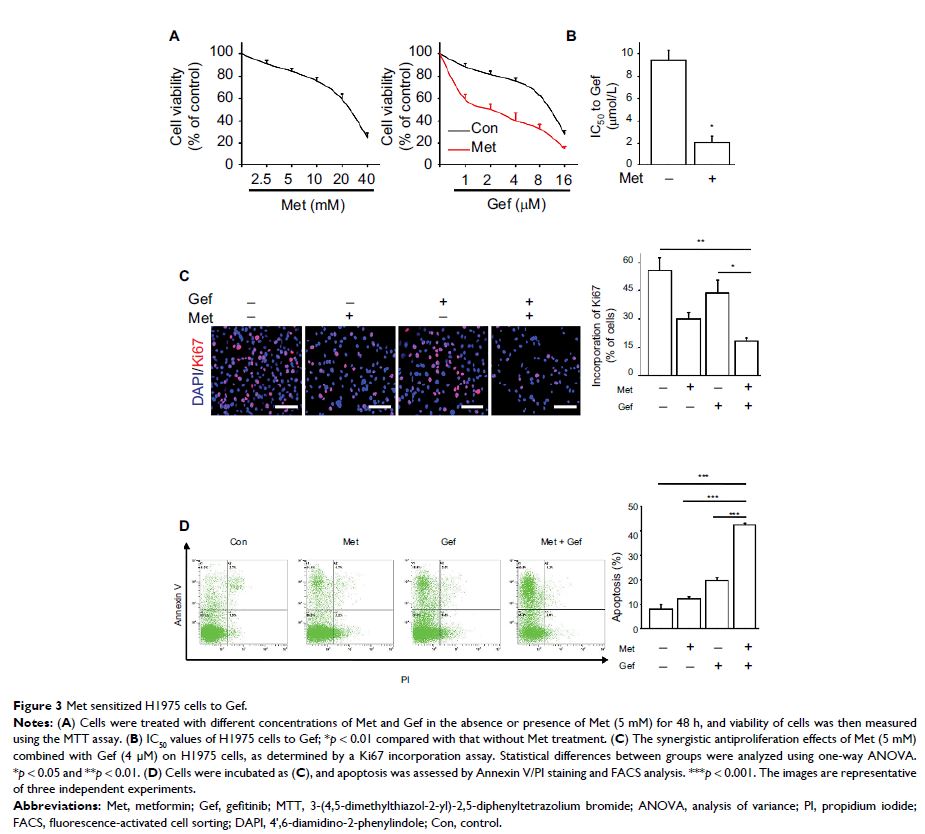108605
论文已发表
注册即可获取德孚的最新动态
IF 收录期刊
- 3.4 Breast Cancer (Dove Med Press)
- 3.2 Clin Epidemiol
- 2.6 Cancer Manag Res
- 2.9 Infect Drug Resist
- 3.7 Clin Interv Aging
- 5.1 Drug Des Dev Ther
- 3.1 Int J Chronic Obstr
- 6.6 Int J Nanomed
- 2.6 Int J Women's Health
- 2.9 Neuropsych Dis Treat
- 2.8 OncoTargets Ther
- 2.0 Patient Prefer Adher
- 2.2 Ther Clin Risk Manag
- 2.5 J Pain Res
- 3.0 Diabet Metab Synd Ob
- 3.2 Psychol Res Behav Ma
- 3.4 Nat Sci Sleep
- 1.8 Pharmgenomics Pers Med
- 2.0 Risk Manag Healthc Policy
- 4.1 J Inflamm Res
- 2.0 Int J Gen Med
- 3.4 J Hepatocell Carcinoma
- 3.0 J Asthma Allergy
- 2.2 Clin Cosmet Investig Dermatol
- 2.4 J Multidiscip Healthc

二甲双胍和吉非替尼联合治疗通过靶向 IGF-1R 信号通路克服 EGFR 突变及对 EGFR-TKI 的原发性耐药
Authors Pan YH, Jiao L, Lin CY, Lu CH, Li L, Chen HY, Wang YB, He Y
Received 28 February 2018
Accepted for publication 20 May 2018
Published 20 August 2018 Volume 2018:12 Pages 75—86
DOI https://doi.org/10.2147/BTT.S166867
Checked for plagiarism Yes
Review by Single-blind
Peer reviewers approved by Dr Amy Norman
Peer reviewer comments 4
Editor who approved publication: Dr Doris Benbrook
Aim: Although EGFR tyrosine kinase inhibitors (TKIs) have shown dramatic effects against sensitizing EGFR mutations in non-small cell lung cancer (NSCLC), ~20%–30% of NSCLC patients with EGFR-sensitive mutation exhibit intrinsic resistance to EGFR-TKIs. The purpose of the current study was to investigate the enhanced antitumor effect of metformin (Met), a biguanide drug, in combination with gefitinib (Gef) in primary resistant human lung cancer cells and the associated molecular mechanism.
Experimental design: H1975 cell line was treated with Met and/or Gef to examine the inhibition of cell growth and potential mechanism of action by using 3-(4,5-dimethylthiazol-2-yl)-2,5-diphenyltetrazolium bromide (MTT), Ki67 incorporation assay, flow cytometry analysis, small interfering RNA technology, Western blot analysis and xenograft implantation.
Results: Insulin-like growth factor-1 receptor (IGF-1R) signaling pathway was markedly activated in EGFR-TKI primary resistant H1975 cells as compared to EGFR-TKI acquired resistance cells (PC-9GR, H1650-M3) and EGFR-TKI sensitivity cells (PC-9, HCC827). Inhibition of IGF-1R activity by AG-1024 (a small molecule of IGF-1R inhibitor), as well as downregulation of IGF-1R by siRNA, significantly enhanced the ability of Gef to suppress proliferation and induce apoptosis in H1975 cells via the inhibition of AKT activation and subsequent upregulation of Bcl-2-interacting mediator of cell death (BIM). Interestingly, the observation showed that Met combined with Gef treatment had similar tumor growth suppression effects in comparison with the addition of AG-1024 to therapy with Gef. A clear synergistic antiproliferative interaction between Met and Gef was observed with a combination index (CI) value of 0.65. Notably, IGF-1R silencing mediated by RNA interference (RNAi) attenuated anticancer effects of Met without obviously resensitizing H1975 cells to Gef. Finally, Met-based combinatorial therapy effectively blocked tumor growth in the xenograft with TKI primary resistant lung cancer cells.
Conclusion: Our findings demonstrated that Met combined with Gef would be a promising strategy to overcome EGFR-TKI primary resistance via suppressing IGF-1R signaling pathway in NSCLC.
Keywords: metformin, gefitinib, IGF-1R, primary resistance, lung cancer
